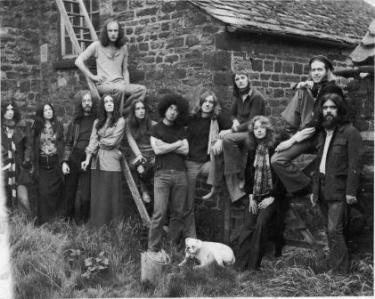Principal Edwards Magic Theatre
Principal Edwards Magic Theatre: 1968 - 1971
Musicians
Root Cartwright guitar / mandolin / recorder
Belinda Bourquin fiddle / piano / recorder / vocals
David Jones percussion
Lyn Edwards percussion
Terry Budd drums
Roger Swallow drums
Jeremy Ensor bass guitar
Joe Read bass guitar
Martin Stellman vocal
Vivienne McAuliffe vocal
Dancers
Eva Darlow
Monica Nettles
John Hill
Gillian Hadley
Projectionists, Props, Effects
Leslie Adey
Harry Housman
Christopher Runciman
History
The collective was originally formed at the University of Exeter in the late 1960s, and then was later based at a farmhouse in Kettering, Northamptonshire as a commune after educational studies were causing conflict with their musical activities. The core of the group was Belinda Borquin, David Jones, and Root Cartwright backed by several musicians and dancers.
The group was signed to John Peel's Dandelion Records after he witnessed their first gig, and their single, "The Ballad of a Big Girl Now", was released in 1969. Following the single, the band released of two albums - Soundtrack and The Asmoto Running Band - the second of which was produced by Nick Mason of Pink Floyd. During this time, the group opened for several acts including Pink Floyd, Led Zeppelin, and Fleetwood Mac.
The sometimes whimsical, sometimes epic (verging on progressive rock) writing style of guitarist Root Cartwright, was paired with the eclectic lyrical contributions of David Jones, Gillian Hadley and Monica Nettles, and was performed by vocalist Vivienne McAuliffe. The violin and recorders of Bindy Bourquin were another key element of the group's trademark sound. Lyn Edwards, originally on bongos, took over on the drumkit.
History

Principal Edwards Magic Theatre began at Exeter University in 1968 as a loosely-based artistic co-operative.
It was the first group to be signed by John Peel's Dandelion record label and broadcast on Night Ride and Top Gear.
A clash between musical and academic activities led to the members leaving university and establishing themselves in a large farmhouse outside Kettering.
The band recorded two albums, "
SoundTrack" and "
Asmoto Running Band", and a single, "Ballad", and toured for 2.5 years.
Serious tensions between fringe theatre and rock priority, together with buslness hassles, led to a break-up in December 1971.
John Peel's Disc and Music Echo column - April 5th 1969
